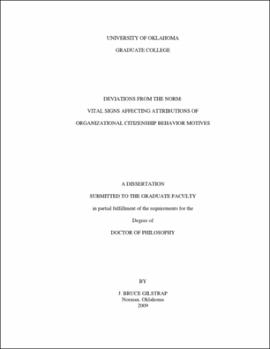| dc.contributor.advisor | Bolino, Mark C | |
| dc.creator | Gilstrap, Jimmie Bruce | |
| dc.date.accessioned | 2019-04-27T21:34:49Z | |
| dc.date.available | 2019-04-27T21:34:49Z | |
| dc.date.issued | 2009 | |
| dc.identifier | 99312441802042 | |
| dc.identifier.uri | https://hdl.handle.net/11244/319060 | |
| dc.description.abstract | Since the organizational citizenship behavior (OCB) construct was introduced twenty-five years ago (Bateman & Organ, 1983; Smith, Organ, & Near, 1983), researchers have directed a great deal of research effort toward understanding the antecedents and outcomes of these behaviors. Less attention, however, has been devoted to the underlying motivation for engaging in such behaviors, how peers evaluate coworkers' OCB, how peers' and supervisors' evaluations of these behaviors might differ, and the role played by OCB norms (Ehrhart & Naumann, 2004) in these evaluative processes. The purpose of this dissertation, therefore, is to examine specific hypotheses related to research questions arising from these gaps in the OCB literature. By addressing these questions, I hope to make four contributions. | |
| dc.description.abstract | First, this research addresses the peer evaluation gap in the OCB literature. Whereas most previous research has focused on supervisors' evaluation of OCB, markedly less research has addressed peer evaluations of coworkers' OCB. Second, this research addresses potential differences between supervisor and peer evaluations of others' OCB that may arise due to the different perspectives held by each of these types of observers. Third, this research addresses the role of attributions of motive about others' OCB. Though most prior research has downplayed the role of attributed motive, it may be that motive affects the relationship between OCB and its outcomes. Fourth, this research addresses a nascent topic in OCB research: OCB norms. Specifically, I examined the effect of deviation from OCB norms on the motives employees attributed to their coworkers' OCB. | |
| dc.description.abstract | I examined these questions in a sample of 51 employees. The results derived from this study do not support most of the hypotheses I constructed. OCB appears to be a strong predictor of prosocial motive, but there is only a little support for the hypothesized supervisor-peer differences. Furthermore, deviation from OCB norms does not significantly affect attributions of prosocial motive, nor does prosocial motive moderate the relationship between OCB and individual-level outcomes. These results appear to have been influenced by spuriously-high correlation between OCB and prosocial motive; the possible reasons for this correlation - as well as other aspects of the study that may have affected the results - are the focus of the Discussion. | |
| dc.format.extent | 189 pages | |
| dc.format.medium | application.pdf | |
| dc.language | en_US | |
| dc.relation.requires | Adobe Acrobat Reader | |
| dc.subject | Corporate culture | |
| dc.subject | Employee motivation | |
| dc.subject | Peer review | |
| dc.subject | Organizational behavior | |
| dc.title | DEVIATIONS FROM THE NORM: VITAL SIGNS AFFECTING ATTRIBUTIONS OF ORGANIZATIONAL CITIZENSHIP BEHAVIOR MOTIVES | |
| dc.type | text | |
| dc.type | document | |
| dc.thesis.degree | Ph.D. | |
| ou.group | Michael F. Price College of Business | |
